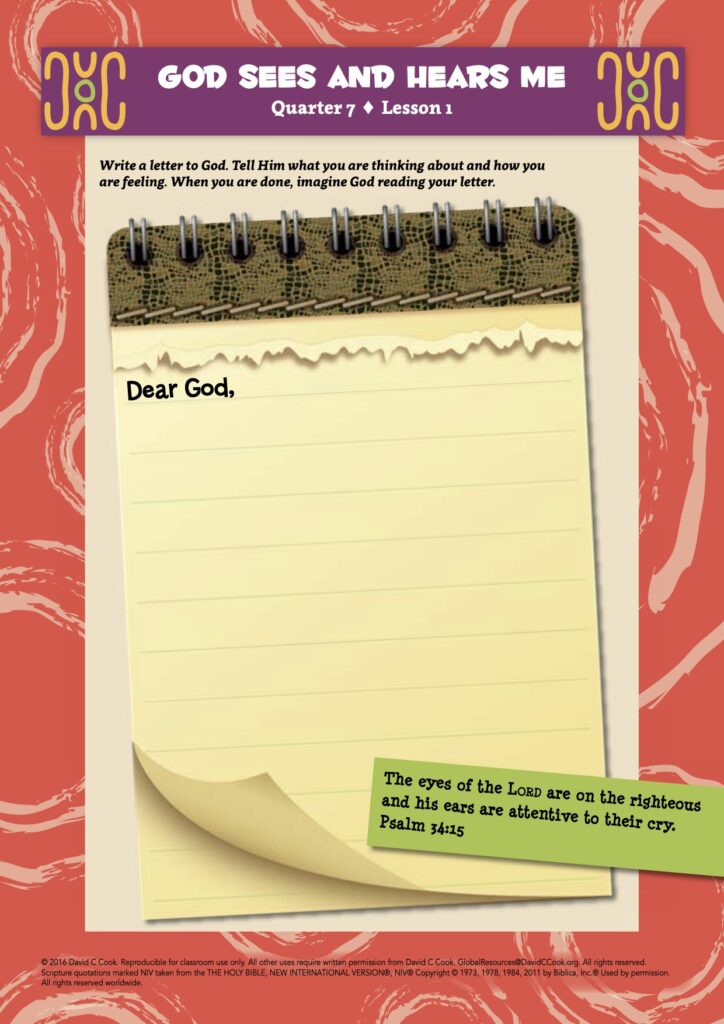During the lesson, the information for you to know is written in regular type, and what we suggest speaking or reading aloud to children is in bold. All resources for this lesson, including the Teacher Guide, Student Page, Family Connection Card, and other resources can be downloaded in a ZIP file by clicking on the following link:
In some lessons you will find "resource articles." These are articles written by experts from around the world to help equip you for your work with children and adolescents. Share them with parents or guardians if you consider it appropriate.
Before class, think of a common phrase or word with 2 parts that are easy to say—for example, “zebra crossing.” Choose something that is familiar to children in your community. You will use the phrase or word for the Connecting game.
The eyes of the Lord are on the righteous, and his ears are attentive to their cry.
Psalm 34:15
God sees and hears you. He does not watch your every move as an angry judge or a watchful law enforcer. He does not get annoyed by your cries or listen to you with contempt. God sees you and hears you because He loves you as a Father. He listens to you with the patience and attention of a good shepherd.
This week, write God a letter. If you do not have paper and a pencil, speak the words of your letter out loud rather than writing them. God is your loving Father, and He longs to hear you. Tell Him what you are thinking and feeling. Then imagine Him reading your letter. Ask Him to speak to you, and think about these questions:
What do you hear God saying to you in response to your letter? (Remember that God’s words to you always align with the Bible, which is His Word.)
Can you sense how much He cares about you?
Let the families of your children know that you are starting a 4-week unit about listening to God in prayer. Explain that this week the children will learn that God sees and hears them. Encourage them to ask their children about the story of Ishmael and Hagar. Who were they? How did God show that He saw and heard them?
Teacher Tip: If possible, email or text the Family Connection Card to the families of your students.
Greet your children by name if possible as they come to class. Calling them by name communicates that you notice and value them.
Choose 1 child to be the Caller. Tell the class the 2-part word or phrase you chose. Explain that the Caller will wear a blindfold. Every time the Caller says the first part of the word or phrase, everyone else must shout the second part. For example, if your phrase is “zebra crossing,” the Caller will say, “zebra,” and everyone else will shout, “crossing” The Caller will try to guess where the children are by listening to their voices. He will then try to tag one of them. Everyone else’s goal is to avoid being tagged by the Caller. When the Caller successfully tags another child, that child becomes the new Caller.
Place the blindfold on the Caller. Be sure he does not run into a wall or furniture. Play for about 5 minutes then ask the children to sit down.
Allow 2–3 children to answer.
In order to successfully find the other children, the Caller had to listen well. Over the next 4 weeks, you will learn about listening to God. You will learn how to recognize God’s voice when He speaks to you. You will learn that everything God says always agrees with the Bible because the Bible is His Word.
Today you will hear a story from the Bible of how God listened to the crying of a very sad boy and his mother, and cared for them. You will learn that God also sees and hears you.
You might say a few emotions to help the children—for example, anger, loneliness, or happiness. Encourage the children to include both positive and negative emotions.
Explain that today your children will hear the story of a boy who experienced many of these feelings. His name was Ishmael.
Optional: If you are using The Action Bible, let the children follow along on pages 56–59 as you tell this story.

Tell the story below with lots of expression.
The fighting began in Ishmael’s home even before he was born. In fact, it started soon after Ishmael’s mother found out she was pregnant with him.
Here is the problem: Ishmael’s mother, Hagar, was not married to his father, Abraham. She was only a servant in the household and a foreigner. Abraham’s first wife was named Sarah. But Sarah was not able to have children.
At first Sarah had thought it would be good for Abraham to have a baby with Hagar. But after Hagar became pregnant, it did not seem like such a good idea anymore. Sarah and Hagar fought about it all the time. One day when they were arguing, and Sarah was very upset. She mistreated Hagar, and Hagar ran away.
Hagar was so unhappy that she ran away into the desert. She found a spring to sit near.
The Bible does not tell us how she felt or what she was thinking. But can you imagine how Hagar might have felt? She may have felt scared. Perhaps she felt betrayed and abandoned. Maybe she was angry.
Maybe she wondered, “Who will take care of me now? What will happen to this little one inside me? Will my baby and I die?”
But while Hagar was sitting there, something very surprising happened. The angel of the
Lord spoke with her and asked where she was going. “I am running away from my mistress,” Hagar replied.
“Go back to her and do what she tells you to do,” the angel said. “God has heard of your misery, Hagar,” he said. He then told her that she would have a son and that she was to name him Ishmael, which means “God hears.” God promised Hagar that she would have so many descendants that she would not be able to count them all. God cared what happened to her and Ishmael!
Hagar was amazed. “God saw me!” she said. From then on she called God “El Roi,” which means “the God who sees me.” She said, “You are the God who sees me. I have now seen the One who sees me!”
Hagar obeyed God and returned to Sarah and Abraham. A few months later, Ishmael was born. Several years passed, and then a miracle happened. Even though Sarah was very old now, God gave her a son. This made Sarah very happy. But Ishmael was not happy.
Sarah complained to Abraham. She wanted Hagar and Ishmael to leave. This greatly upset Abraham. He cared about Ishmael. But God told Abraham that He would take care of Ishmael. So Abraham packed some food and water for Hagar and Ishmael and sent them away.
Back to the desert they went. Hagar was sure they would die this time. When their water ran out, she looked for a place to rest. She settled Ishmael under a bush where he could at least have shade. Then she moved away from him a little because she did not want to watch him die.
There they both were, Ishmael crying under his bush, Hagar sobbing a few meters away from him.
Do you remember what Ishmael’s name means? It means “God hears.” Do you remember what El Roi, the name Hagar gave to God, means? It means “the God who sees me.”
Call on 2–3 children to share their guesses.
Let’s read the next part of the story directly from the Bible.
Read Genesis 21:17–19 from your Bible. It is also printed here:
God heard the boy crying, and the angel of God called to Hagar from heaven and said to her, “What is the matter, Hagar? Do not be afraid; God has heard the boy crying as he lies there. Lift the boy up and take him by the hand, for I will make him into a great nation.” Then God opened her eyes and she saw a well of water. So she went and filled the skin with water and gave the boy a drink.
Genesis 21:17–19
The God who saw Hagar before Ishmael was born now heard the boy crying. He cared for the boy and his mother by showing them a well where they could get water to drink.
From that day on, even though they lived in the desert, God was always with Ishmael. They had enough to eat because Ishmael learned to hunt with a bow. And they had enough to drink because El Roi had shown them a well.
God saw them. He heard them. Did you know that He cares about you in the same way?
Encourage the children to talk about the story.
Children may answer that God saw them, He heard their cries, He made promises to care for them, He showed them a well.
Encourage more than 1 child to share. If no one shares, be prepared to share a story from your own life.
Did you know that there are different ways to talk to God and listen to Him? One way is praying out loud. Praying silently in your heart is another. You can also write your prayer to God in the form of a letter. And you can listen for His words to you. Let’s try that now.
Think of a time when you had some strong feelings such as sadness, anger, loneliness, fear, anxiety, etc. You might think of something that happened today or this week, or it may be from a very long time ago. In your mind, write a letter to God about what happened and what you felt. As you do this, think of Him as a very caring, loving Father or a wonderful Friend. He is both of these and much more! Do not be afraid to be honest. He cares about all of your feelings all the time.
Encourage the children to quietly think of what they would tell God about themselves and their hurts and joys as if they were writing them a letter.
After you have finished your letter to Him, sit quietly for a few minutes. You might want to imagine Him reading your letter. Ask Him to speak to you. What do you hear Him saying to you in response to your letter? You may imagine Him saying He loves you. Or maybe you think of Him promising to care for you as He cared for Ishmael and Hagar. Remember that God will speak to you in ways that agree with the Bible, which is His Word. If you do not know if what you hear agrees with God’s Word, come talk with me now or after class.
Optional Supplies:
Give each child a piece of paper and pencil. Tell them that they will write a letter to God. Encourage the children to write in the language they use when they pray to God. Afterward, they can imagine God reading their letters.
If you are using Student Pages, use them for this activity.
Invite the children to read their letters aloud if they want to share. Assure them that they do not have to share their letters if they do not want to do so.
End of Option

Close class by speaking this blessing based on Psalm 34:15 over the children.
Show the Memory Verse poster if you are using it.
The eyes of the Lord are on the righteous, and his ears are attentive to their cry.
Psalm 34:15

Blessing: The eyes of the Lord are on you, His child. His ears hear your cry. He sees you and loves you. May you hear His voice this week.
Lead the children in singing this quarter’s song, if possible.
Life on Life ©2020 David C Cook. Reproducible for home or classroom use only. All other uses require written permission from David C Cook [email protected]. All rights reserved.